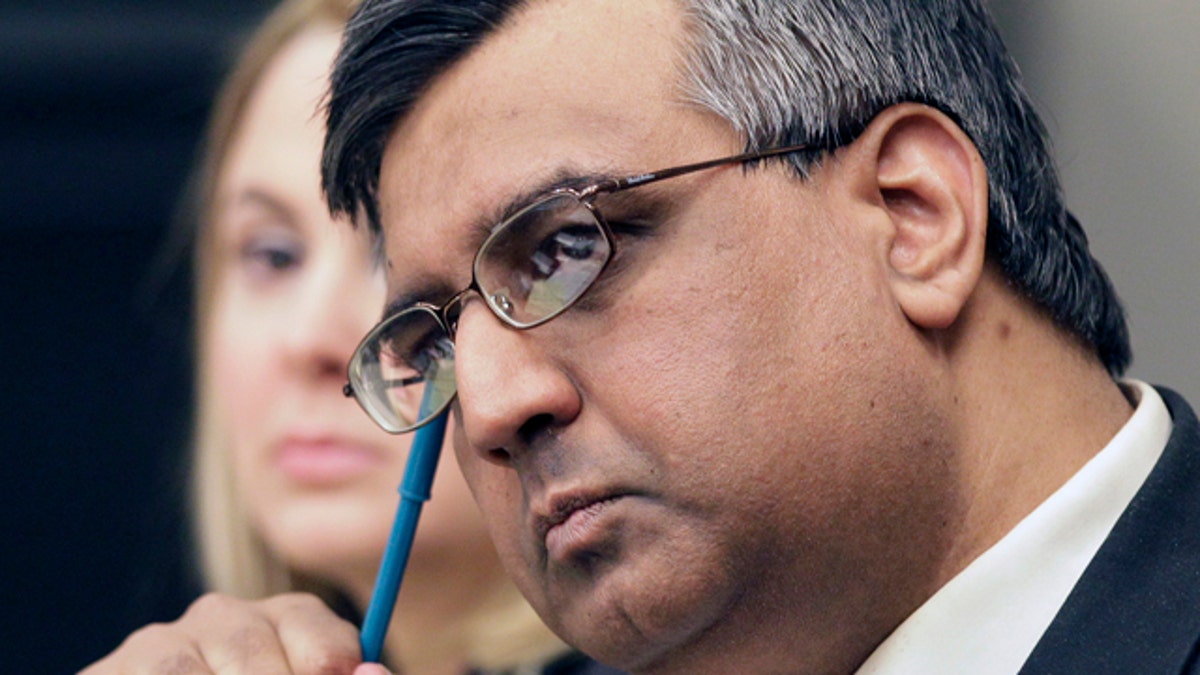
Jan. 18: Muzzammil Hassan listens during opening statements during his trial in Buffalo, N.Y. (AP)
BUFFALO, N.Y. -- The founder of a Muslim-oriented New York television station was convicted Monday of beheading his wife in 2009 in the studio the couple had opened to counter negative stereotypes of Muslims after the Sept. 11 terror attacks.
Muzzammil "Mo" Hassan never denied that he killed Aasiya Hassan inside the suburban Buffalo station the couple established to promote cultural understanding. A jury deliberated for one hour before rejecting his claim that the killing was justified because he was long abused by and afraid of his wife.
Hassan, who's stocky and more than 6 feet tall, acted as his own lawyer during the trial. He said nothing when the verdict was read. His reaction was blocked from view by a line of sheriff's deputies and court officers standing behind him at the defense table.
The Pakistan-born Hassan, 46, had been served with divorce papers a week before his wife's body was found at the offices of Bridges TV in Orchard Park, where the couple also lived. Hassan was arrested after walking into the Orchard Park police station Feb. 12, 2009, and calmly telling officers his wife, who was slender and several inches shorter than him, was dead.
Prosecutor Colleen Curtin Gable said Hassan bought two hunting knives less than an hour before the attack, parked his luxury vehicle out of view at the station and then hid in wait inside. During a 37-second frenzy that began when Hassan's wife walked through the door, he stabbed her more than 40 times in the face, back and chest and decapitated her. Surveillance video captured some of the attack inside a darkened hallway.
Curtin Gable said Hassan "went on and on about his hurt and pain."
"Think of Aasiya's hurt and pain in years of marriage and the final 30 or 40 seconds . trying desperately to fend off his two knives with her hands and possibly being conscious as he began to behead her," Curtin Gable said during a closing statement that had some jurors dabbing tears from their eyes.
Hassan spent his two-hour closing remarks describing himself as a slave to his wife's rages. He said he was let down by a domestic-violence system that refuses to recognize men as victims.
He said a "religion of patriarchy" in the domestic-violence system had "unleashed a bloodbath on American women because battered men have no legal way out."
"You're the only ones who've ever heard my side of the story after silence for 10 years," Hassan told jurors.
He said he didn't blame his wife, but her troubled childhood, for abusive behavior he called "the evil dragon."
But Hassan never produced any witnesses or evidence to corroborate his abuse claims, unlike prosecutors, who cited numerous police reports filed by his wife and her medical records to prove she was the battered spouse.
Aasiya Hassan, 37, had sought treatment for ailments including neck and back pain and early onset cataracts, which may have been caused by repeated trauma, Curtin Gable said.
When Mo Hassan killed his wife, their then 4- and 6-year-old children were buckled into car seats outside in a van along with his teenage son from one of his two previous marriages. His wife had been on her way to take them to dinner when she ran into the station to drop off his laundry.
After the killing, the two younger children were sent to live with their mother's family in Pakistan, Hassan's attorneys have said. Hassan also had a teenage daughter.
The Hassans started the Bridges TV network in 2004, saying they wanted to counter negative stereotypes and media portrayals of Muslims in a post-9/11 world and provide programming for the growing Muslim-American population. Bridges TV continues to broadcast.
In the months leading up to his trial, Hassan had explored various versions of a psychiatric defense with different attorneys, who said they would pursue an acquittal by showing the killing was justified.
But prosecutors said it was clear Hassan was a master manipulator who sought to control every aspect of his wife's life, especially after she'd filed for divorce and put his reputation at risk.
"How dare she tell him enough is enough?" Curtin Gable said. "He was not going to let that happen."
From the start, his lawyers dismissed suggestions that culture played a role in the killing.
Immediately after the wife's death, the manner in which she died prompted speculation her death was an honor killing. The practice is still accepted among some fanatical Muslim men, including in the couple's native Pakistan, who feel betrayed by their wives.
Attorney Nadia Shahram, who lectures on the effects of religion and culture on family law at the University at Buffalo, said Monday she believed "this was more than a domestic-violence homicide."
Shahram, who was in the courtroom for closing arguments, said several factors led her to believe the death was "a mix of domestic violence and honor killing," including the separation of the victim's head from her body.
"He separated the mind, which he saw as worthless, and kicked it," she said.
Hassan fired three of his lawyers and replaced a fourth with himself. He kept the fourth lawyer as an adviser, as required by law. He faces up to 25 years to life in prison when he is sentenced March 9.
